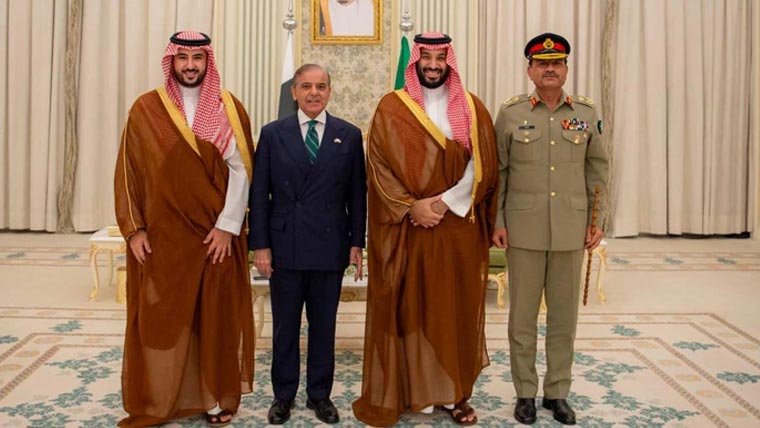Dr Bilawal Kamran
The signing of the Strategic Mutual Defence Agreement between Pakistan and Saudi Arabia in Riyadh marks a defining moment in the evolving regional order. While Islamabad and Riyadh have enjoyed a security partnership for decades, this pact carries greater symbolic and practical weight by explicitly reaffirming that “aggression against either country shall be considered aggression against both.” In a Middle East torn by war, insecurity, and shifting alliances, this agreement underscores a new phase of collective security thinking within the Muslim world.
Defence cooperation between Pakistan and Saudi Arabia is not new; it dates back to the 1960s. Over the years, Pakistani troops have been stationed in the Kingdom to provide training, advisory roles, and active protection. Beyond personnel exchange, both states have relied on each other during crises—Riyadh benefiting from Pakistan’s highly professional army, and Islamabad relying on Saudi political and financial support. The latest pact, however, formalises these arrangements in a way that is both comprehensive and forward-looking, transforming old understandings into a strategic security framework.
The timing of the agreement is crucial. Only days before the signing, Israel launched a military strike on Qatar, fuelling unease in the wider Gulf. The incident has pushed Arab states to reassess their heavy dependence on the United States. Despite decades of close ties, Gulf monarchies increasingly perceive Washington as an unreliable protector, especially in moments of acute crisis. In this context, Pakistan—with its combat-tested military, nuclear capability, and established political goodwill across the Gulf—emerges as a natural partner. The pact thus signals a recalibration of defence alignments in the broader Muslim world.
While the agreement is framed around Middle Eastern security, its implications for South Asia cannot be ignored. The question arises: if India were to launch another act of aggression against Pakistan, would Riyadh extend military support? The ambiguity here demands clarity. Saudi Arabia maintains cordial economic and political ties with India, but the logic of mutual defence suggests that Pakistan’s security cannot be compartmentalised. Unsurprisingly, New Delhi has reacted cautiously, with its foreign ministry declaring that it is “studying the implications” of the pact. This demonstrates how the deal reverberates beyond the Gulf into South Asia’s fragile balance of power.
https://facebook.com/RepublicPolicy
For Islamabad, this is a significant diplomatic win. In an environment where Pakistan is often portrayed as isolated, this agreement affirms its centrality in Muslim world security. It also reinforces Pakistan’s role as more than a regional South Asian actor, elevating it into a position where its military strength is directly tied to the security calculations of the Middle East. If effectively pursued, this development could deepen bilateral trust, enhance defence cooperation, and expand Pakistan’s influence across Gulf capitals.
https://tiktok.com/@republic_policy
Beyond Saudi Arabia, other Gulf states may explore similar defence frameworks with Pakistan. The smaller monarchies, many of which face acute security threats, could find reassurance in a partnership with Pakistan’s armed forces. However, bilateralism alone may not suffice to secure the region. The wider question of collective Muslim security remains unresolved, and this is where multilateral frameworks need urgent revitalisation.
https://instagram.com/republicpolicy
Established in 2015 and led by Pakistan’s former army chief General Raheel Sharif, the Islamic Military Counter Terrorism Coalition (IMCTC) already provides the skeleton of a Muslim defence alliance. Yet, in its current form, it remains underutilised, confined largely to counterterrorism coordination. Redefining its mandate to address collective defence could transform it into a true “Muslim Nato.” Expanding membership to include states like Iran and others currently outside the fold would further strengthen its legitimacy. Such inclusivity could signal that Muslim states, despite internal differences, are capable of uniting to confront external aggression.
https://whatsapp.com/channel/0029VaYMzpX5Ui2WAdHrSg1G
The Gaza genocide has exposed the inability of fragmented Muslim states to deter or respond effectively to Israeli aggression. A strengthened Pak-Saudi defence pact, embedded within a wider Muslim coalition, could send a powerful message of deterrence. By pooling military, economic, and political resources, Muslim states could prevent further assaults on Palestinians and discourage hostile powers from targeting regional states. For Pakistan, the pact thus serves not only as bilateral security assurance but also as an opportunity to lead efforts toward a collective security order in the Muslim world.
The Pakistan-Saudi Strategic Defence Agreement is more than a bilateral accord—it is a statement about shifting global realities and regional aspirations. It reflects Riyadh’s gradual detachment from American security guarantees and Islamabad’s growing recognition as a pillar of Muslim world defence. To fully realise its potential, however, the agreement must go beyond symbolic commitments. It should be leveraged to build trust, expand military collaboration, and serve as the foundation of a broader collective security framework, one that can protect not only Pakistan and Saudi Arabia but also the entire Muslim world from external aggression.
















